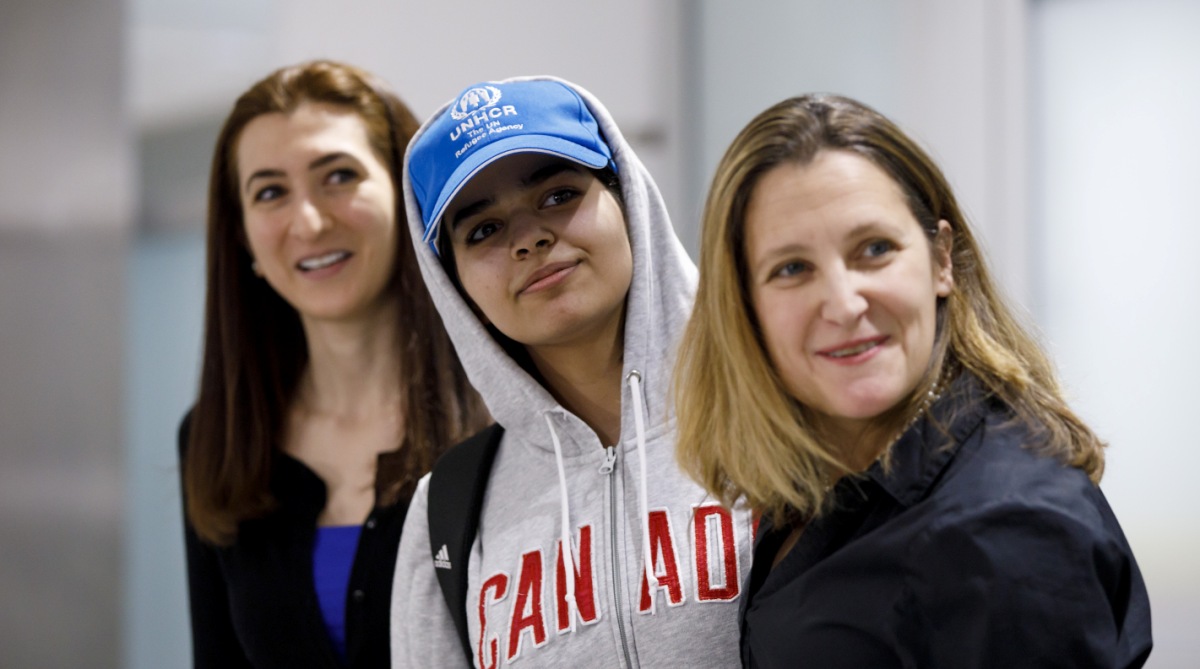Two Indo-Canadian men among 5 arrested for Canada’s largest gold heist
Two Indo-Canadian men are among five South Asians arrested for Canada's largest gold heist at Toronto airport.
Tired but smiling, an 18-year-old Saudi woman who said she feared death if deported back home arrived Saturday in Canada, which offered her asylum in a case that attracted global attention after she mounted a social media campaign.

Asylum Seeker Rahaf Mohammed al-Qunun, 18, smiles as she is introduced to the media at Toronto Pearson International Airport, alongside Canadian minister of Foreign Affairs Chrystia Freeland, right, on January 12, 2019 in Toronto, Canada. (Photo: Cole Burston/Getty Images/AFP)
Tired but smiling, an 18-year-old Saudi woman who said she feared death if deported back home arrived Saturday in Canada, which offered her asylum in a case that attracted global attention after she mounted a social media campaign.
“This is Rahaf Al-qunun, a very brave new Canadian,” Foreign Minister Chrystia Freeland said arm-in-arm with the Saudi woman in Toronto’s airport.
Rahaf Mohammed Al-qunun smiled broadly as she exited an airport arrival door sporting a Canada zipper hoodie and a UN High Commissioner for Refugees hat, capping a dramatic week that saw her flee her family while visiting Kuwait and before flying to Bangkok.
Advertisement
Once there, she barricaded herself in an airport hotel to avoid deportation and tweeted about her situation.
On Friday, Prime Minister Justin Trudeau announced that Canada would accept Al-qunun as a refugee.
Her situation has highlighted the cause of women’s rights in Saudi Arabia, where several women fleeing abuse by their families have been caught trying to seek asylum abroad in recent years and returned home.
Freeland said Al-qunun preferred not to take questions Saturday.
“She is obviously very tired after a long journey and she preferred to go and get settled,” Freeland said.
“But it was Rahaf’s choice to come out and say hello to Canadians. She wanted Canadians to see that she’s here, that she’s well and that she’s very happy to be in her new home.”
After arriving she was off to get winter clothes, said Mario Calla, executive director of COSTI Immigrant Services, which is helping her settle in temporary housing and applying for a health card.
Calla said Al-qunun has friends in Toronto who she would be meeting up with this weekend.
“She did comment to me about the cold,” Freeland said.
“It does get warmer,” Freeland said she told her.
Al-qunun flew to Toronto via Seoul, South Korea, according to Thai immigration Police Chief Surachate Hakparn.
Al-qunun tweeted two pictures from her plane seat one with what appears to be a glass of wine and her passport and another holding her passport while on the plane with the hashtag “I did it” and the emojis showing a plane, hearts and a wine glass.
Canada’s decision to grant her asylum could further upset the country’s relations with Saudi Arabia.
In August, Saudi Arabia expelled Canada’s ambassador to the kingdom and withdrew its own ambassador after Canada’s Foreign Ministry tweeted support for women’s right activists who had been arrested.
The Saudis also sold Canadian investments and ordered their citizens studying in Canada to leave.
Freeland avoided an answer when asked what Al-qunun’s case would mean to Saudi relations.
There was no immediate Saudi government reaction, nor any mention of her arrival in state media.
Freeland said that the UN refugee agency found she was in danger in Thailand and that Canada’s government is glad it was able to act quickly to offer her refuge.
Al-qunun’s father arrived in Bangkok on Tuesday, but his daughter refused to meet with him.
Several other countries, including Australia, had been in talks with the UN’s refugee agency to accept Al-qunun, Surachate said.
“She chose Canada. It’s her personal decision,” he said.
Australian media reported that UNHCR had withdrawn its referral for Al-qunun to be resettled in Australia because Canberra was taking too long to decide on her asylum.
“When referring cases with specific vulnerabilities who need immediate resettlement, we attach great importance to the speed at which countries consider and process cases,” a UNHCR spokesperson in Bangkok told The Associated Press in an email reply on condition of anonymity because the person wasn’t authorised to discuss the case publicly.
“Why did Rahaf go to Canada instead of her preferred choice of Australia where she had friends?” Human Rights Watch executive director Kenneth Roth said in a tweet.
“Because she needed safety from her Saudi pursuers fast, and Canada expedited her case while Australia (under Home Affairs Minister Peter Dutton) slow-walked it.”
Canada’s ambassador saw her off at the airport, where Al-qunun thanked everyone for helping her.
She plans to start learning more English, though she already speaks it more than passably.
Al-qunun was stopped January 5 at Bangkok’s Suvarnabhumi Airport by immigration police who denied her entry and seized her passport.
She barricaded herself in an airport hotel room where her social media campaign got enough public and diplomatic support that Thai officials admitted her temporarily under the protection of UN officials, who granted her refugee status Wednesday.
Surachate said her father whose name has not been released denied physically abusing Al-qunun or trying to force her into an arranged marriage, which were among the reasons she gave for her flight.
He said Al-qunun’s father wanted his daughter back but respected her decision.
“He has 10 children. He said the daughter might feel neglected sometimes,” Surachate said.
UNHCR spokeswoman Lauren LaRose the fact she was processed so quickly is a credit to those that made it happen.
“This is someone who was clearly in harm’s way, who clearly felt her life with her threatened, and my colleagues in concert with governments in Thailand and Canada recognized that need,” she said.
Advertisement